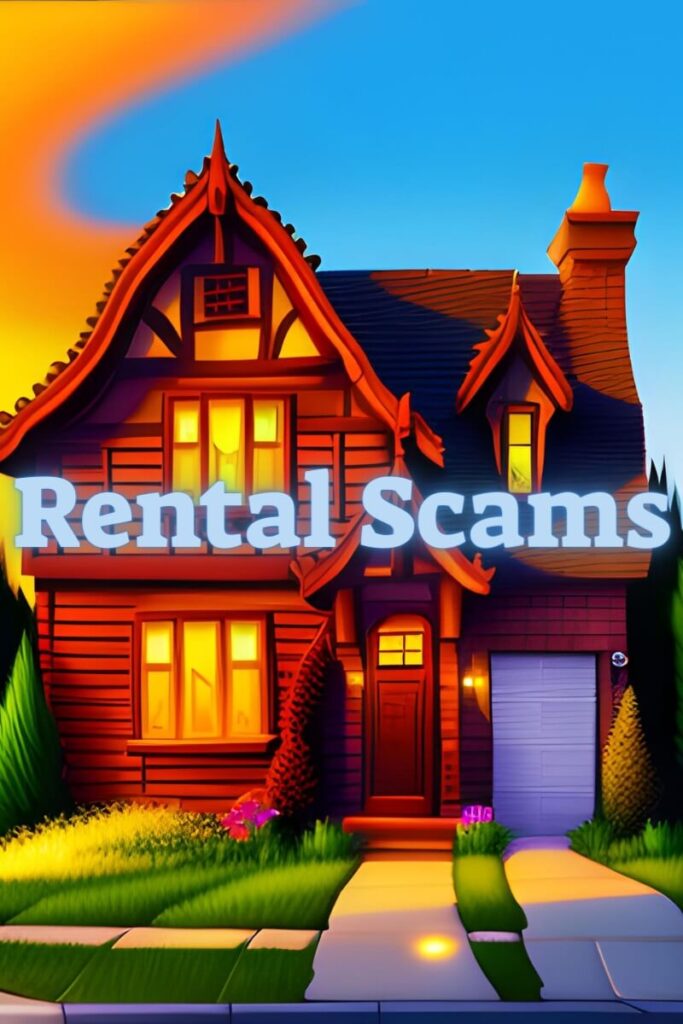Hey there! So, have you ever heard of rental scams? It’s pretty messed up, but unfortunately, they’re becoming more and more common these days. Rental scams are when scammers trick people into paying money for a rental property that doesn’t actually exist or isn’t available for rent.

These scammers might post fake rental ads online or even show up in person pretending to be landlords. They’ll ask for a deposit or first month’s rent upfront, and then disappear with the money, leaving the renter with nothing.
It’s not just individuals who fall victim to rental scams, either. Even businesses can get scammed. In fact, some scammers specifically target companies looking to rent office space.
It’s a scary situation to be in, especially since the scammers are often hard to track down and the money lost is rarely recovered. That’s why it’s important to know how to spot a rental scam before you hand over any cash.
Recently, on May 1, 2023, we received the following complaint from a New Jersey, USA person:
A while back, I had a Wells Fargo account, and I fell victim to a rental scam where I almost rented a home. The scam seemed legitimate, and I ended up sending $5,000 to the scammer through Zelle. Later, I found out that it was a scam, but unfortunately, I was told that there was nothing that could be done about it. This happened back in 2017-2018, and I’m still fighting to recover my lost money.
Based on the information provided, it appears that the individual was scammed out of $5,000 by a person who claimed to be renting out a home. The individual transferred the money via Zelle, which is a peer-to-peer payment service. However, after transferring the money, the individual discovered that the rental was a scam and they were not able to recover their funds.
This could be classified as a rental scam, in which a fraudster impersonates a landlord or property manager to trick victims into paying money for a rental property that does not exist or that they do not have the authority to rent out.
Are you looking to rent a new place? That’s exciting, but you know what’s not exciting? Falling for a rental scam.
It’s unfortunately all too common these days, with scammers preying on eager renters who are just looking for a new home. That’s why it’s so important to be aware of these scams by reading this article and sharing it with your friends and loved ones so that they also know how to protect themselves.
Don’t let a scammer ruin your rental experience – arm yourself with knowledge and stay safe out there!
Types of Rental Scams
Rental scammers will post fake ads for rentals, usually offering a too-good-to-be-true deal, to lure you in. Then, they’ll either ask for a bunch of personal info or demand payment upfront before you’ve even seen the place.
Sometimes, they’ll even go so far as to steal someone’s identity to make the scam seem legit.
So, be on the lookout for any red flags, like a landlord who won’t meet you in person or asks for payment in weird ways (like through gift cards or wire transfers). And always do your due diligence, like checking out the property in person and doing a background check on the landlord.
Here are some of the most common types of rental scams:
Rent-to-Own Scams
On May 1, 2023, we received another complaint, this time from a Pennsylvania, USA person who claims to have been scammed for $10,000, according to which, the individual was scammed into a rent-to-own agreement for a mobile home that was not in good working condition. The individual paid a sum of $7,000 which included a non-refundable deposit of $5,000 and the first month’s rent. After moving in, they discovered multiple issues with the home including cut gas lines, leaking pipes, electrical problems, carpenter ants, and a hole in the floor.
They fell and sustained injuries due to the poor condition of the property. The individual fell behind on rent and was taken to the magistrate and put under a payment plan. However, before they could make their first payment, they were served a notice of repossession and eventually forced to leave. It seems to be a rental scam, where the individual was promised a rent-to-own agreement for a mobile home that was not in good condition and faced unexpected expenses and legal action as a result.
Rent-to-own scams are fraudulent schemes in which scammers pose as landlords or property owners who offer a rent-to-own agreement to unsuspecting tenants.
These scams usually involve a fake rental agreement that promises to turn the rental property into an owned property after a certain period of time, usually through a series of monthly rent payments that also serve as down payments.
One common example of a rent-to-own scam is when the supposed landlord or property owner asks for a large down payment or deposit upfront and then disappears, leaving the tenant with nothing. In some cases, the scammers may even change the locks on the property, preventing the tenant from entering the home or apartment they thought they were renting.
Another common tactic used by rent-to-own scammers is identity theft. They may ask for personal information from potential tenants, such as their Social Security number, credit card information, and other sensitive data. This information can then be used to steal the tenant’s identity, which can result in financial losses and other serious consequences.
To avoid falling victim to rent-to-own scams, there are several warning signs to watch out for. These include
- landlords who ask for large deposits or upfront payments,
- properties that seem too good to be true or are significantly underpriced compared to similar listings,
- landlords who are difficult to reach or don’t have a legitimate business address or phone number,
- and those who pressure tenants to sign a lease or rental agreement without allowing them enough time to review and understand the terms.
It’s also important to always do a background check on the landlord or property owner, including checking their business registration and any reviews or complaints from previous tenants.
Fake Listings
Scammers post fake rental listings on online classifieds or rental websites.
They use photos and descriptions of real rental properties and ask for a deposit or application fee before the victim can see the property.
Once the money is sent, the scammer disappears, leaving the victim without a rental or money.
Phantom Rentals
Scammers claim to be landlords or property managers and offer rental properties that do not actually exist.
They may ask for personal information or a deposit before the victim can see the property. Once the money is sent, the scammer disappears.
What’s the difference between fake listings and phantom rentals?
Fake listings involve scammers creating fake rental listings for properties that don’t actually exist. They may use photos and descriptions of real properties, but they will not have access to the property to show it to potential renters. Instead, they will ask for deposits or fees upfront, and disappear with the money once they receive it.
Phantom rentals, on the other hand, involve scammers offering properties that are actually available for rent, but without the owner’s knowledge or consent. They may pose as the property owner or a legitimate property management company and offer the property for rent. Once the victim pays the security deposit and first month’s rent, the scammer disappears and the victim finds out that they have been scammed.
In short, fake listings are for properties that do not exist, while phantom rentals are for real properties being offered without the owner’s consent.
Sublet Scams
Scammers pose as tenants who are looking for someone to sublet their rental property.
They ask for a deposit or rent payment upfront but then disappear without giving the keys or allowing access to the property.
Roommate Scams
Scammers pose as potential roommates and ask for a deposit or rent payment upfront.
Once the money is sent, the scammer disappears without moving in.
What’s the difference between roommate scams and sublet scams?
In roommate scams, the scammer poses as a potential roommate who is looking for a place to live. They may respond to an advertisement for a roommate or reach out to someone who is looking for a roommate. Once they have gained access to the property, they may refuse to pay rent or engage in other illegal activities.
On the other hand, sublet scams involve a scammer posing as the current tenant of a rental property who is looking for someone to take over their lease. The scammer may advertise the sublet on online marketplaces or social media platforms. Once they have received payment for the sublet, they may disappear without providing access to the property or falsely claiming that the sublet is no longer available.
In both cases, victims may lose money and be left without a place to live. It’s important to be cautious when dealing with potential roommates or sublets and to thoroughly vet anyone who will have access to your property.
Overpayment Rental Scams
Scammers respond to legitimate rental listings and pay more than the rent amount.
They then ask the victim to wire the excess amount back to them.
The original payment is later revealed to be fraudulent, leaving the victim without the money they wired and potentially facing legal trouble for unwittingly passing a fake check.
Unlicensed rental agents
Scammers may pose as licensed rental agents or property managers, and request fees or deposits for properties that they do not actually manage or own.
Airbnb rental scams
Scammers create fake listings on Airbnb or similar short-term rental platforms, often using stolen photos and descriptions of legitimate properties, and they request payment outside of the platform, leaving the renter without any protection or recourse if the property is not as advertised or does not exist.
How to Protect Yourself from Rental Scams
Research the Property and Landlord
Here are some tips for researching a rental property and landlord:
- Check online listings and reviews: Check online rental listings and read reviews from previous tenants to get an idea of the landlord and the property.
- Look up the landlord’s name: Conduct an online search of the landlord’s name to see if they have a history of scams or negative reviews.
- Check public records: Look up the property owner and rental history through public records to confirm ownership and see if there are any outstanding issues with the property. (See below.)
- Verify the landlord’s contact information: Confirm the landlord’s contact information, such as their phone number and email address, to make sure it’s legitimate.
- Visit the property in person: Schedule a visit to the rental property and inspect it thoroughly, taking note of any damages or issues.
- Ask for references: Ask the landlord for references from previous tenants to get a better understanding of their rental history.
- Review the lease agreement: Carefully review the lease agreement and make sure you understand all the terms and conditions before signing.
- Trust your instincts: If something seems too good to be true or if you feel uncomfortable, it’s better to err on the side of caution and keep looking for other rental options.
When researching a rental property and landlord, some public records that you may want to check include:
- Property ownership records: You can check with the local county assessor’s office or recorder’s office to find out who owns the property.
- Building code violations: Check with the local building department to see if there are any outstanding code violations or orders to correct issues with the property.
- Property tax records: You can check with the local county tax assessor’s office to see if property taxes are current or if there are any liens on the property.
- Court records: Check with the local court system to see if there are any lawsuits or judgments against the landlord or property owner.
- Criminal records: You can check with the local police department or county sheriff’s office to see if there are any criminal records associated with the landlord or property owner.
- Eviction records: Check with the local court system to see if there are any eviction records associated with the landlord or property owner.
- Complaints with the Better Business Bureau: Check with the Better Business Bureau to see if there are any complaints against the landlord or property owner.
It’s important to note that some of these records may not be available in all areas or may require a fee to access.
Additionally, while public records can be a useful tool for researching a rental property and landlord, they should be used in conjunction with other research methods, such as checking online reviews and talking to current and former tenants.
Use Trusted Platforms
Here are some suggestions for finding trustworthy rental platforms:
- Use reputable websites: Stick to rental platforms that are well-known and established, such as Zillow, Trulia, Apartments.com, and Craigslist.
- Read reviews: Look for rental platforms that have positive reviews from other renters. Check the reviews for feedback on the quality of the platform’s service, reliability, and ease of use.
- Check for security features: Make sure that the platform has security features such as identity verification, background checks, and secure payment systems.
- Verify the listings: Verify the listings by doing a reverse image search to ensure that the property is not a fake listing. You can also verify the property owner by looking up their information on public records.
- Check for scam warnings: Check for warnings about rental scams on the platform’s website or through online forums. A good rental platform will have information on how to identify and avoid rental scams.
- Consider using a real estate agent: If you are unsure about the credibility of a rental platform, consider using a licensed real estate agent to help you find a rental property. Agents have access to multiple listing services (MLS) and can help you find legitimate rental options.
Be Wary of Red Flags
Here are some common red flags to look out for when searching for a rental property:
- Prices that seem too good to be true: If a rental property is being advertised at a significantly lower price than other properties in the same area, it could be a red flag that something is not right.
- Requests for payment before viewing the property: If a landlord or property manager asks for a payment before you have even viewed the property, it could be a sign that it is a scam.
- Pressure to sign a lease immediately: If a landlord or property manager is pressuring you to sign a lease immediately and not giving you time to think it over or review the lease agreement, it could be a sign that they are trying to rush you into something.
- Lack of transparency: If a landlord or property manager is not providing clear information about the property, the lease agreement, or other important details, it could be a sign that they are trying to hide something.
- Poor communication: If a landlord or property manager is difficult to reach, takes a long time to respond to your questions or concerns, or doesn’t communicate clearly and effectively, it could be a red flag that they are not trustworthy.
- Unprofessional or unreliable behavior: If a landlord or property manager displays unprofessional or unreliable behavior, such as not showing up for scheduled appointments or being disorganized, it could be a sign that they are not trustworthy.
- Inconsistent information: If the information provided about the rental property or landlord is inconsistent, it could be a sign that something is not right.
It’s important to be aware of these red flags and to take steps to protect yourself when searching for a rental property.
Never Send Money Without Seeing the Property
Viewing a rental property in person is an important step in the rental process. It allows you to see the property firsthand, check for any damages or issues, and get a sense of the neighborhood and surrounding area. It also helps to confirm that the property and landlord are legitimate.
Sending money without seeing the property or meeting the landlord in person can leave you vulnerable to rental scams. Scammers often use fake listings and fake identities to trick renters into sending money for properties that don’t exist or are not actually for rent.
By viewing the rental property in person, you can ensure that the property matches the listing and that the landlord is who they claim to be. This can help you avoid falling victim to rental scams and ensure that you are getting a legitimate rental property.
Report Suspected Rental Scams
If you’ve been a victim of a rental scam or you suspect a rental scam, here are some suggestions for reporting it to relevant authorities:
- Contact your local police department and file a report. Provide them with any evidence you have, including emails, text messages, or phone records.
- Contact the Federal Trade Commission (FTC) and file a complaint. The FTC is responsible for enforcing federal laws related to consumer protection and can take legal action against scammers.
- Contact the Internet Crime Complaint Center (IC3) and file a complaint. The IC3 is a partnership between the FBI and the National White Collar Crime Center and is responsible for investigating and prosecuting internet-related crimes.
- Contact the Better Business Bureau (BBB) and file a complaint. The BBB is a non-profit organization that provides consumers with information about businesses and helps resolve disputes between consumers and businesses.
- Contact your state’s attorney general’s office and file a complaint. They can investigate the scam and take legal action if necessary.
It’s important to report rental scams to relevant authorities so they can investigate and take action against scammers. It also helps protect others from falling victim to the same scam.
Bottom Line
So, there you have it folks, we’ve covered some of the most common rental scams out there, including fake listings, identity theft, sublet scams, roommate scams, and rent-to-own scams. It’s important to do your research and be aware of the warning signs before sending any money or personal information.
Remember to always view the rental property in person before making any payments, and be cautious of deals that seem too good to be true. Look out for red flags like landlords who are reluctant to provide a lease agreement or who ask for cash-only payments.
If you do fall victim to a rental scam, be sure to report it to the relevant authorities, including the Federal Trade Commission, the Internet Crime Complaint Center, and your local law enforcement agency.
At the end of the day, the key is to be vigilant and cautious when searching for a rental property. By following these tips and staying informed, you can protect yourself from falling prey to rental scams and find a safe and secure place to call home.
If you are a victim of a rental scam, please let us know by commenting below and if you have lost a significant amount of money to online scams, do not lose hope. We can help you recover your funds!



